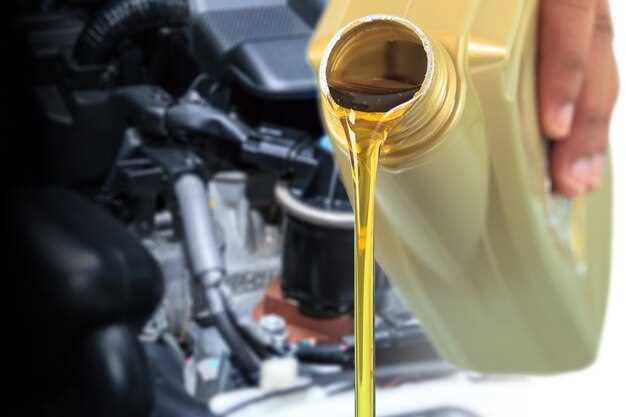
When it comes to maintaining the health and performance of your diesel engine, selecting the right oil is crucial. Diesel engines operate under high stress and extreme conditions, necessitating a lubricant that offers superior protection and efficiency. The oil you choose not only impacts the engine’s longevity but also its overall performance.
Proper care of your diesel engine begins with understanding the specific requirements of your vehicle. Diesel oils are formulated differently than gasoline engine oils, featuring added detergents, anti-wear additives, and better thermal stability. This unique composition helps in combating the challenges that diesel engines face, such as soot buildup and contamination.
In this article, we will break down the essential factors to consider when selecting the best oil for diesel engines. From viscosity ratings to additives, we aim to simplify your decision-making process. By understanding these elements, you will be better equipped to provide the best care for your diesel engine, ensuring a smooth and efficient operation for years to come.
Understanding Oil Specifications and Grades for Diesel Engines

When it comes to maintaining the longevity and efficiency of diesel engines, choosing the right oil is crucial. Diesel engine oils are specifically formulated to handle the unique demands placed on them, which is why understanding oil specifications and grades is essential for any vehicle owner.
Oil specifications are defined by organizations such as the American Petroleum Institute (API) and the Society of Automotive Engineers (SAE). These specifications provide guidelines on the performance and quality standards that engine oils must meet. For diesel engines, the API rating often includes a “C” designation, such as CJ-4 or CK-4, which signifies that the oil is suitable for compression-ignition engines. These ratings ensure that the oil can effectively protect the engine components, reduce wear, and maintain performance under high-pressure conditions.
Another important factor to consider is the grade of the oil, which refers to its viscosity. The viscosity grade is denoted by the SAE number, which can range from 0W to 60, with the “W” indicating winter performance. Lower numbers represent thinner oils that flow more easily at low temperatures, while higher numbers indicate thicker oils that provide better protection at high temperatures. Diesel engines often require multigrade oils, such as 15W-40, that offer a balance of protection across a wide temperature range, allowing for optimal performance in varying conditions.
When selecting oil for diesel engines, it is also important to consider its additive package. Diesel engine oils typically contain detergents, dispersants, and anti-wear additives that help keep the engine clean and protect against deposits and sludge buildup. These additives are essential for maintaining the engine’s performance and ensuring its reliability over time.
In summary, understanding oil specifications and grades for diesel engines involves recognizing the importance of API ratings, viscosity grades, and the role of additives. By choosing the right oil and taking proper care of your diesel engine, you can ensure it operates efficiently and lasts for many years.
Key Factors to Consider When Selecting Diesel Engine Oil

Choosing the right oil for your diesel engine is essential for optimal performance and longevity. One of the primary considerations is the oil’s viscosity grade, which impacts the engine’s ability to operate under various temperature conditions. Engine oils are rated using the Society of Automotive Engineers (SAE) system, such as 15W-40 or 5W-30, indicating their thickness and flow characteristics in both cold and hot conditions.
Another important factor is the oil’s specification, which should meet or exceed the requirements set by the engine manufacturer. Look for oils that adhere to standards established by organizations like API (American Petroleum Institute) or ACEA (European Automobile Manufacturers Association). Different diesel engines have distinct needs; hence, using the right specification can significantly affect the engine’s performance and efficiency.
Additives in diesel engine oil also play a crucial role in enhancing engine protection and performance. These additives can include detergents, dispersants, anti-wear agents, and antioxidants, all of which help to keep the engine clean, reduce friction, and extend oil life. Choosing oil with suitable additives is vital for maintaining engine health, especially in high-stress operating conditions.
Consideration of the oil change interval is also essential. Synthetic oils often have longer change intervals compared to conventional oils. However, driving habits, load conditions, and the type of diesel fuel used can influence how frequently you should change your oil. Following the manufacturer’s recommendations can help ensure your engine receives the best care.
Finally, it’s crucial to choose oil from reputable brands. Quality assurance from established manufacturers often ensures consistency and reliability in performance. Investing in high-quality diesel engine oil not only protects your engine but can also lead to savings in maintenance costs over time.
Proper Oil Maintenance Practices to Extend Engine Life
Maintaining proper oil levels and quality is crucial for the longevity of diesel engines. Regular care and attention to oil maintenance can significantly impact engine performance and lifespan. Here are some essential practices to follow:
- Regular Oil Changes: Follow the manufacturer’s recommended schedule for oil changes. Frequent changes help remove contaminants and keep the oil clean.
- Monitor Oil Levels: Regularly check the oil dipstick to ensure that the oil level is within the recommended range. Low oil levels can lead to insufficient lubrication and engine damage.
- Choose the Right Oil: Select high-quality diesel engine oil that meets or exceeds the specifications laid out by the manufacturer. This ensures optimal protection and performance.
- Inspect Oil Condition: Examine the oil’s color and consistency. Dark, thick, or gritty oil indicates the need for a change, as these signs suggest contamination and degradation.
- Monitor for Leaks: Regularly inspect for oil leaks, which can lead to not only low oil levels but also environmental hazards. Addressing leaks promptly protects both the engine and the environment.
Incorporating these maintenance practices into your routine will contribute to the overall health of your diesel engine. Taking the time to care for your oil can lead to improved efficiency, reduced repair costs, and prolonged engine life.




